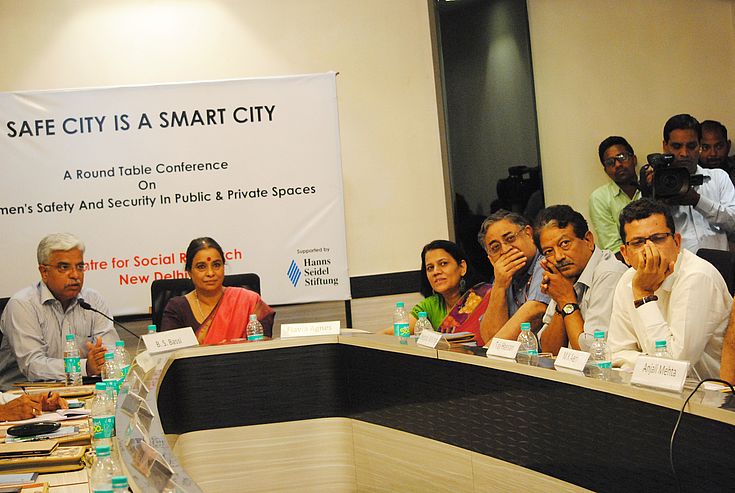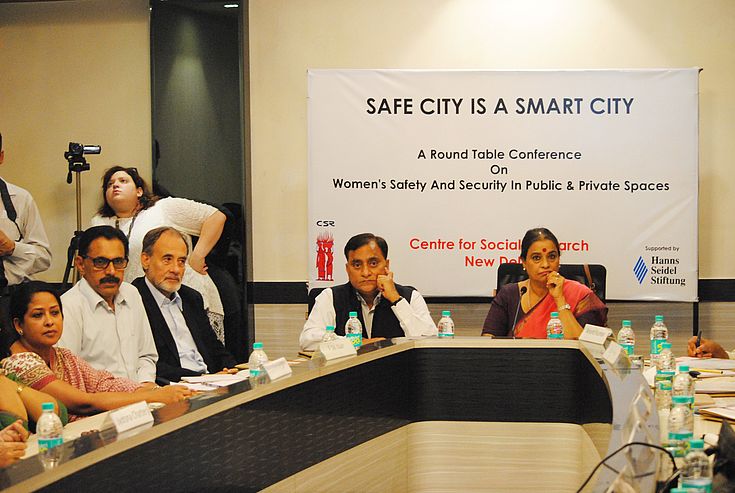News
Safe City is a Smart City: A Round Table Conference on Women's Safety and Security at Public & Private Spaces
Delhi Police Commissioner, Mr. B. S. Bassi (Extreme Left) giving presentation on the subject
The key stakeholders, including NGOs engaged on women’s issues, local government officials, and law enforcement came together in this conference and set an agenda for future coordinated action.
Objectives of the conference:
- Assessing the capacity-building needs of local stakeholders such as social activists, government representatives, police officials, academicians and so on, in order to effectively address crimes against women.
- Discussing how NGOs, civil society and international bodies can collaborate with government bodies to fill the existing gaps.
- Exploring global best practices in state and civil society response to violence against women in urban environments.
- Using the experience of NGOs in the field of victims’ and women’s protection.
Director General, National Disaster Response Force, Mr. O.P. Singh (Second from Right) listening to the views of other participants
Through the Conference, a dialogue was established between high level dignitaries like police officials, activists fighting for women’s rights and academicians. Such platforms are crucial for a unified approach to solving issues concerning society as no progress can be made in isolation. The agenda developed during the Conference aimed to chart out new ways to make Delhi a Safe and Smart City.
The Conference was attended by police officials, social activists, politicians and academicians including Mr. B. S. Bassi, Delhi Commissioner of Police; Mr. J. S. Kochher, Joint Secretary Research and Training, National Human Rights Commission; Mr. Robin Hibu, Joint Commissioner of Police Training; Mr. O. P. Singh, Director General, National Disaster Response Force; Mr. Deepak Mishra, Special Commissioner of Police (Law and Order); Mr. Taj Hassan, IPS; Mr. P. M. Nair, IPS (retd.); Ms. Flavia Agnes, Co-founder MAJLIS; Dr. Jyotsna Chatterji, Director and Secretary, Joint Women’s Program; Prof. Roma Debabrata, President of STOP; Prof. Anand Kumar, former Professor at JNU; Ms. Sharmishtha Mukherjee, member of the Indian National Congress; Adv. Assunta Pardhe, Chief Functionary, Chetna Mahila Vikas Kendra (CMVK); Ms. Scherry Siganporia, Technical Expert, Gender Advisor, GIZ India and many other eminent functionaries along with HSF Resident Representative, Dr. Volker Bauer and colleagues.
There were two broad themes under which the Conference ensued. The discussion among the participants of the Conference results in various suggestions and recommendations on each of the theme. The themes were as follows:
1. City Security: Smart Security and Policing
- How to make streets safer for women
- Transforming policing through digitization
- Role of policing in setting current and future strategies in building safe, secure and resilient cities
2. State Response: Law Enforcement and Public Safety
- Identifying urban city threats for women
- Evaluating security preparedness and meeting security challenges
- Building a safe and secure city by allocating adequate funding and implementing timely and cost effective solutions
The suggestions and recommendations of participants on these themes can be viewed in the detailed report.
Based on the deliberations made by the esteemed guests at the Conference, a twenty point agenda was presented by Ms. Anubhuti Vatsayan, Head of Development Division, CSR:
- Removal of stigma associated with women who are abused and assaulted; shift the blame to the perpetrators.
- Ensuring amiable work environment to increase the proportion of women in police forces.
- Ensure timely justice through setting up systems such as single window clearance for speedy implementation of schemes and policies of the government.
- Gender sensitization training of police to handle cases of violence against women.
- Encourage and incentivize police officials to take up the role of police trainers.
- Work towards for better working conditions for the police force.
- Increase collaborations and partnerships between police and civil society.
- Work towards changing public image of police to inculcate more faith in the police.
- Draft consolidated national goals regarding women’s issues that civil society organizations can work towards in a unified manner.
- Specialized hospitals or forensic labs should be set up for survivors of gender based violence .
- Utilize current research and consider recommendations of national organizations and committees while charting action plans.
- Increase new research initiatives on appropriate technologies to combat the prevalent forms of violence.
- Compulsory introduction of gender sensitization for children and youth in school curricula.
- Increase access to special police cells for women and refocus police priority on gender sensitive law response instead of providing unprofessional mediation services.
- Compilation of national and international level best practices on battling gender based violence.
- Encourage change from below through community involvement and exploring potential for community policing; particularly in urban areas.
- Broaden the working definition of safety to include aspects of general well being, happiness and access to spaces.
- Ensure gender budgeting at the law making stage.
- Ensure an intersectional approach to safety.
- Challenge patriarchy at all levels, beginning with the family.
The detailed report for download: Safe City is a Smart City


